7 Best Project Management Startups to Watch in 2025

In today’s fast-paced digital landscape, project management startups are evolving at lightning speed, becoming critical for ambitious teams aiming to stay ahead.
With innovation surging and the market for these tools expected to reach $10.86B by 2029, startups are rapidly embracing new platforms that redefine collaboration, productivity, and workflow efficiency.
This article spotlights the 7 best project management startups to watch in 2025. You’ll get concise overviews of each, discover their standout features, pricing, benefits, and ideal use cases—helping you find the perfect fit for your team’s unique needs.
7 Best Project Management Startups to Watch in 2025
Choosing the right project management startups can transform the way your team collaborates, tracks progress, and scales in today’s competitive landscape. The market is packed with innovative solutions, each offering unique features and benefits for modern teams.
Below, you’ll find a quick comparison table of the top 7 project management startups to watch in 2025. Each excels in different areas, from no-code customization to creative review workflows.
| Startup | Founded | Location | Free Plan | Starting Price | Best For | Notable Feature |
|---|---|---|---|---|---|---|
| ClickUp | 2017 | San Diego, CA | Yes | $7/user/month | Scalable all-in-one PM | 1,000+ integrations |
| Airtable | 2013 | San Francisco | Yes | $10/user/month | Custom workflows | No-code databases |
| Taskade | 2017 | New York | Yes | $5/user/month | Remote, flexible teams | Mind maps & video chat |
| Monday.com | 2012 | Tel Aviv | Yes | $8/seat/month | Visual workflow teams | Gantt, Kanban, dashboards |
| Notion | 2016 | San Francisco | Yes | $8/user/month | Docs & project blends | Modular knowledge base |
| Filestage | 2014 | Stuttgart | No | €89/month | Creative approvals | Content review workflows |
| Akiflow | 2018 | Padova | Trial | $15/month | Personal productivity | Calendar integration |
Let’s dive deeper into each of these project management startups and see what sets them apart.
ClickUp
ClickUp has rapidly become a leader among project management startups since its 2017 launch in San Diego. With $537.5M raised in Series C funding, ClickUp has positioned itself as a robust, all-in-one productivity platform.
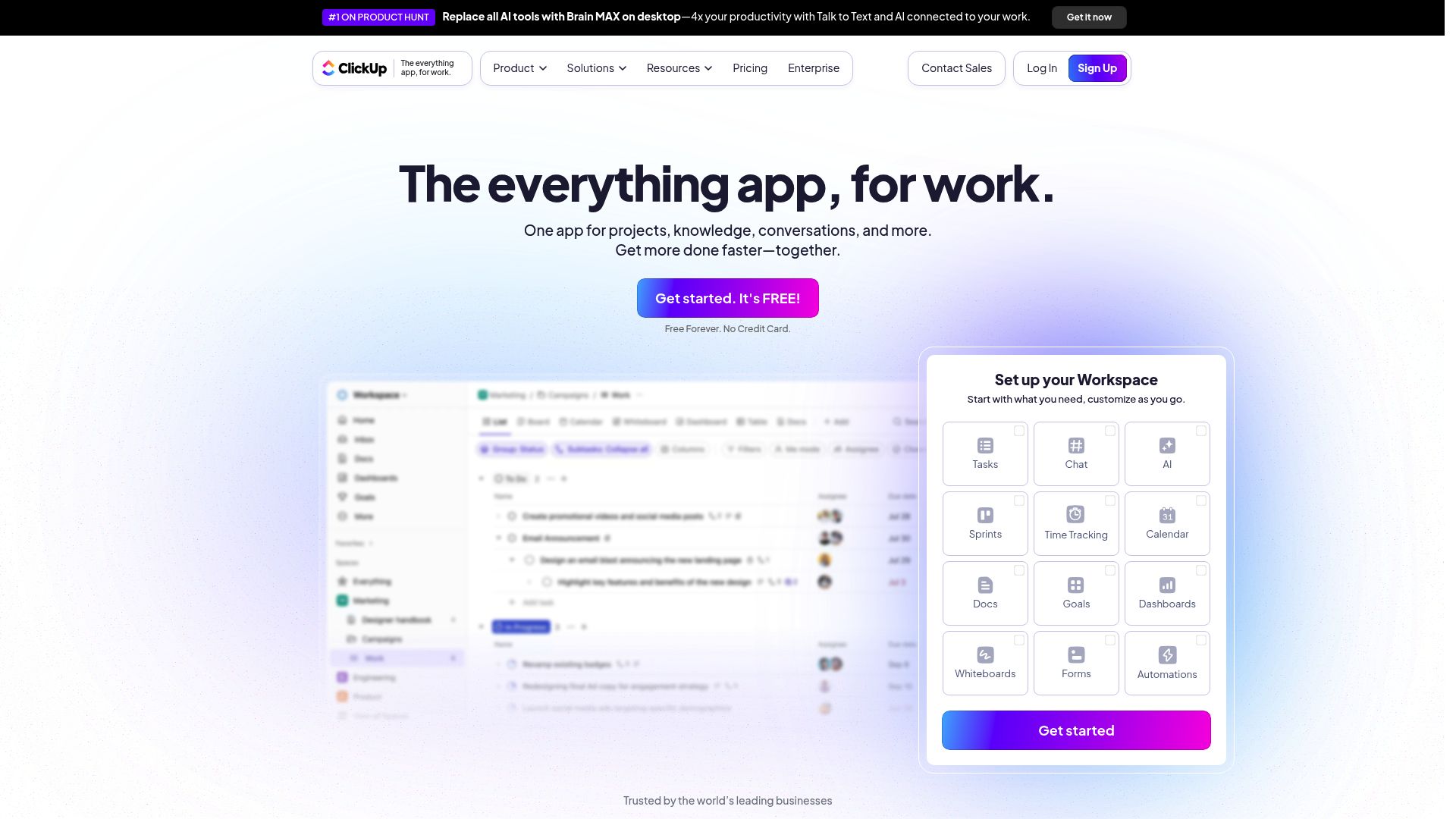
ClickUp’s pricing starts with a generous free plan, allowing teams to test its extensive capabilities. Paid plans begin at $7 per user per month, making it accessible for startups and growing businesses.
Key features include task management, collaborative docs, goal tracking, customizable views, automation, and more than 1,000 integrations. This breadth allows project management startups to centralize their work, automate repetitive tasks, and connect with essential business tools.
One of ClickUp’s biggest strengths is adaptability. Whether you’re a small startup or a scaling enterprise, ClickUp’s flexible structure supports diverse workflows and team sizes. The platform’s intuitive UI and strong integration ecosystem make onboarding smooth for most users.
However, some teams find ClickUp overwhelming at first due to its feature depth. New users may need time to become familiar with all options. Despite this, the platform’s 441% five-year search growth shows surging interest in project management startups focused on comprehensive solutions.
ClickUp is ideal for startups, SMBs, and enterprises seeking a scalable platform with the power to manage everything in one place. For a broader look at how project management startups are shaping the future, check out the Future Trends in Project Management Software, which highlights industry growth and emerging trends.
Airtable
Airtable, launched in 2013 in San Francisco, has raised $1.4B and is a trailblazer among project management startups that embrace no-code and data-centric workflows. Its interface combines the familiarity of spreadsheets with the power of a database, making it a favorite for customizable project tracking.
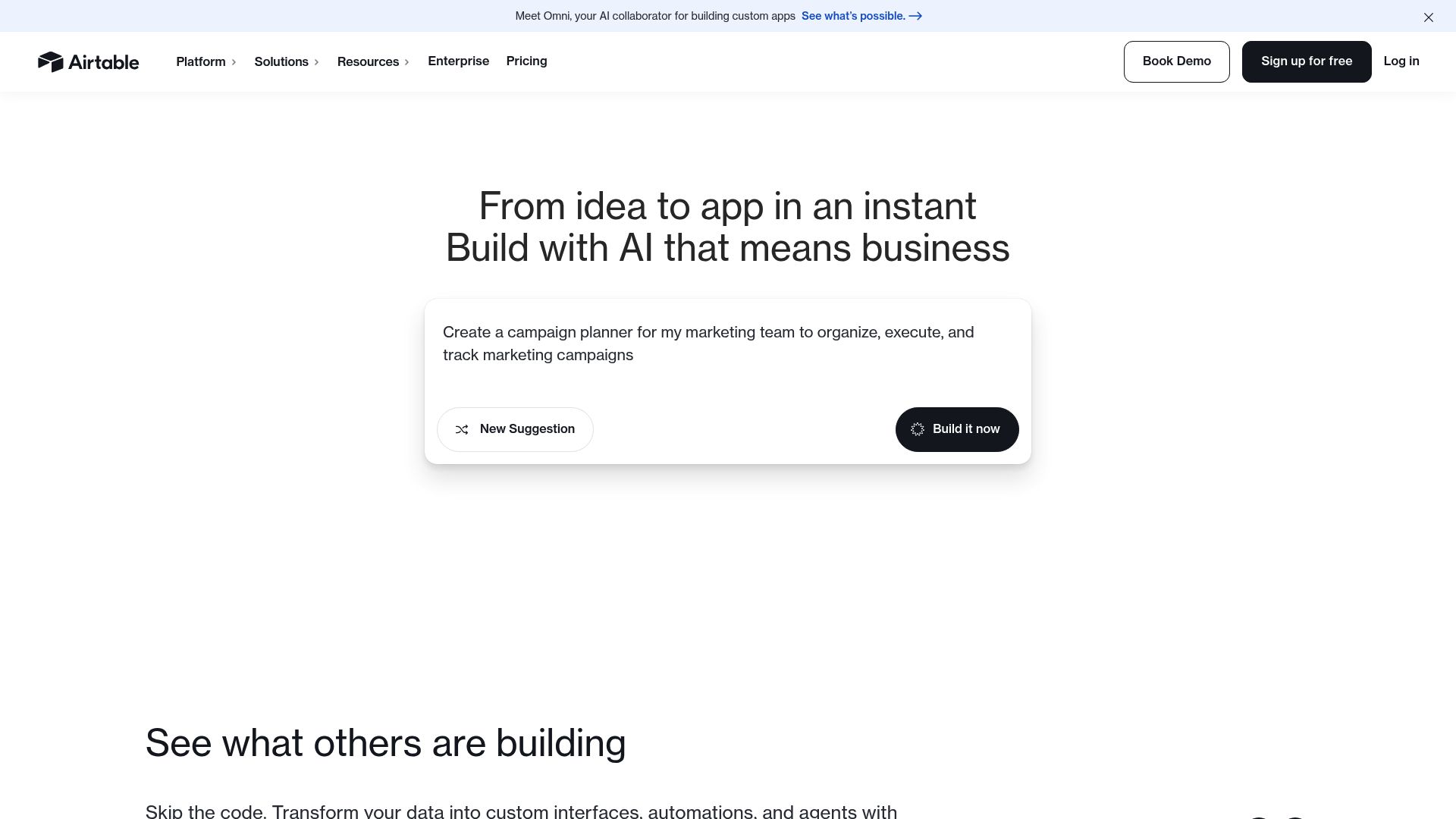
Airtable offers a free plan, while paid options start at $10 per user per month for the Plus plan and $20 for Pro. These tiers unlock advanced features and greater automation, giving startups flexibility as they grow.
Core capabilities include building no-code databases, designing custom workflows, using department-specific templates, automating repetitive tasks, and connecting with popular integrations. Airtable’s visual approach allows teams to set up marketing calendars, manage product launches, and track events without technical expertise.
The platform is especially valued by startups needing flexibility, such as marketing, product, operations, and HR teams. Its template library and user-friendly design make onboarding straightforward, though learning database concepts may pose a challenge for some.
While free and entry-level plans cover most needs, advanced features often require upgrading. This balance makes Airtable a smart choice for startups prioritizing adaptability in project management startups.
Taskade
Taskade, founded in 2017 in New York, stands out among project management startups focused on remote collaboration. With $5.2M in seed funding, Taskade has grown rapidly, boasting a 567% five-year search growth and high-profile backers.
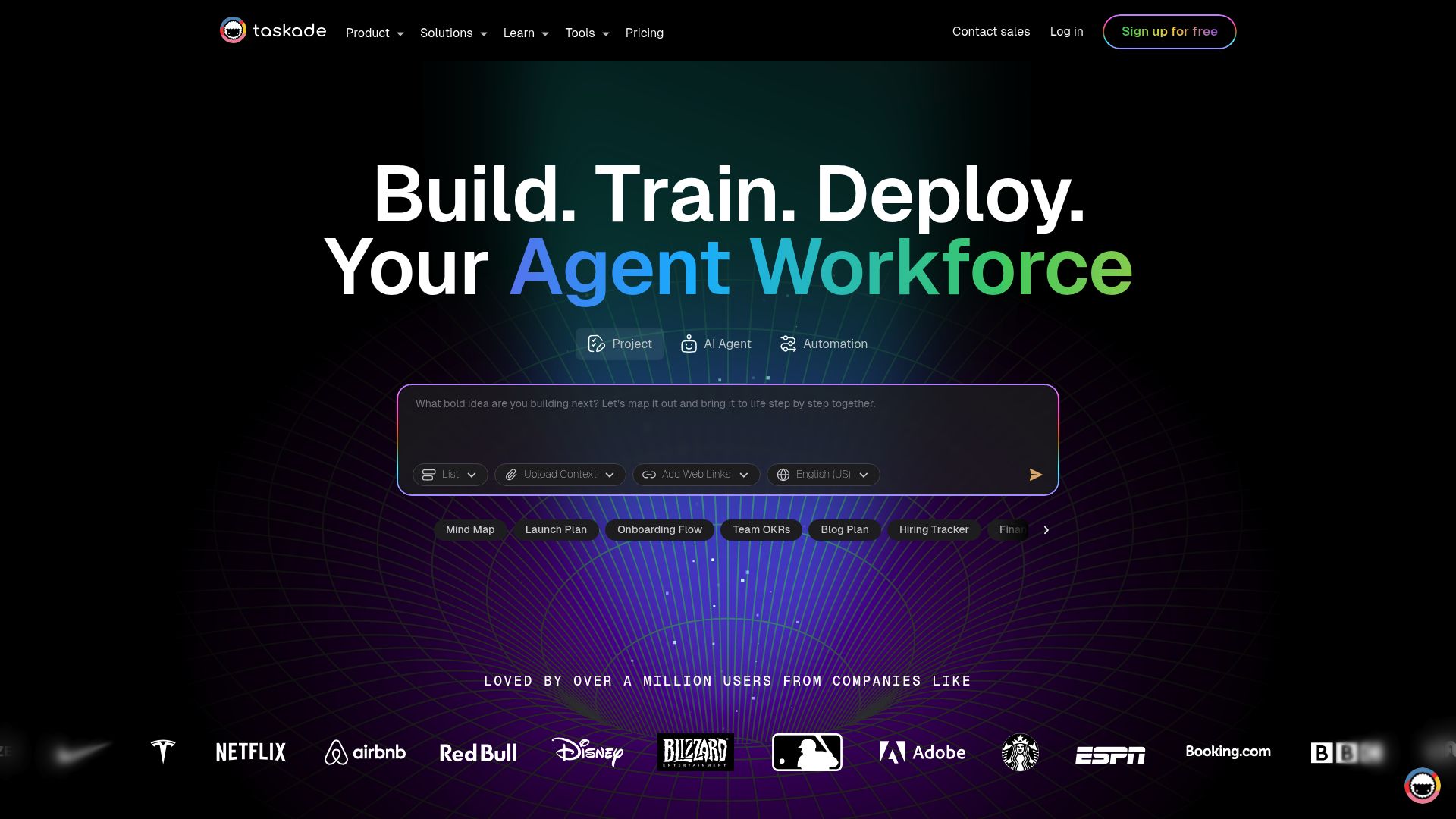
Taskade’s pricing is approachable, offering a free plan and paid options starting at $5 per user per month. This makes it an appealing entry point for startups and freelancers.
Key features include real-time collaboration, to-do lists, mind maps, built-in video chat, project templates, and seamless integrations. Teams can switch between different project views—like lists, boards, or maps—without losing context.
Taskade’s unified workspace is built for remote-first teams. Startups and distributed groups appreciate the ability to chat, brainstorm, and manage tasks in one place. The intuitive interface means teams can get up and running quickly.
A limitation is its smaller ecosystem compared to established project management startups, and advanced reporting is less robust. Still, the platform’s versatility and affordability make it a go-to for remote teams and freelancers needing an agile, collaborative tool.
Monday.com
Monday.com, established in 2012 and headquartered in Tel Aviv, is one of the most recognizable project management startups globally. Now publicly traded, it serves a vast user base across industries.
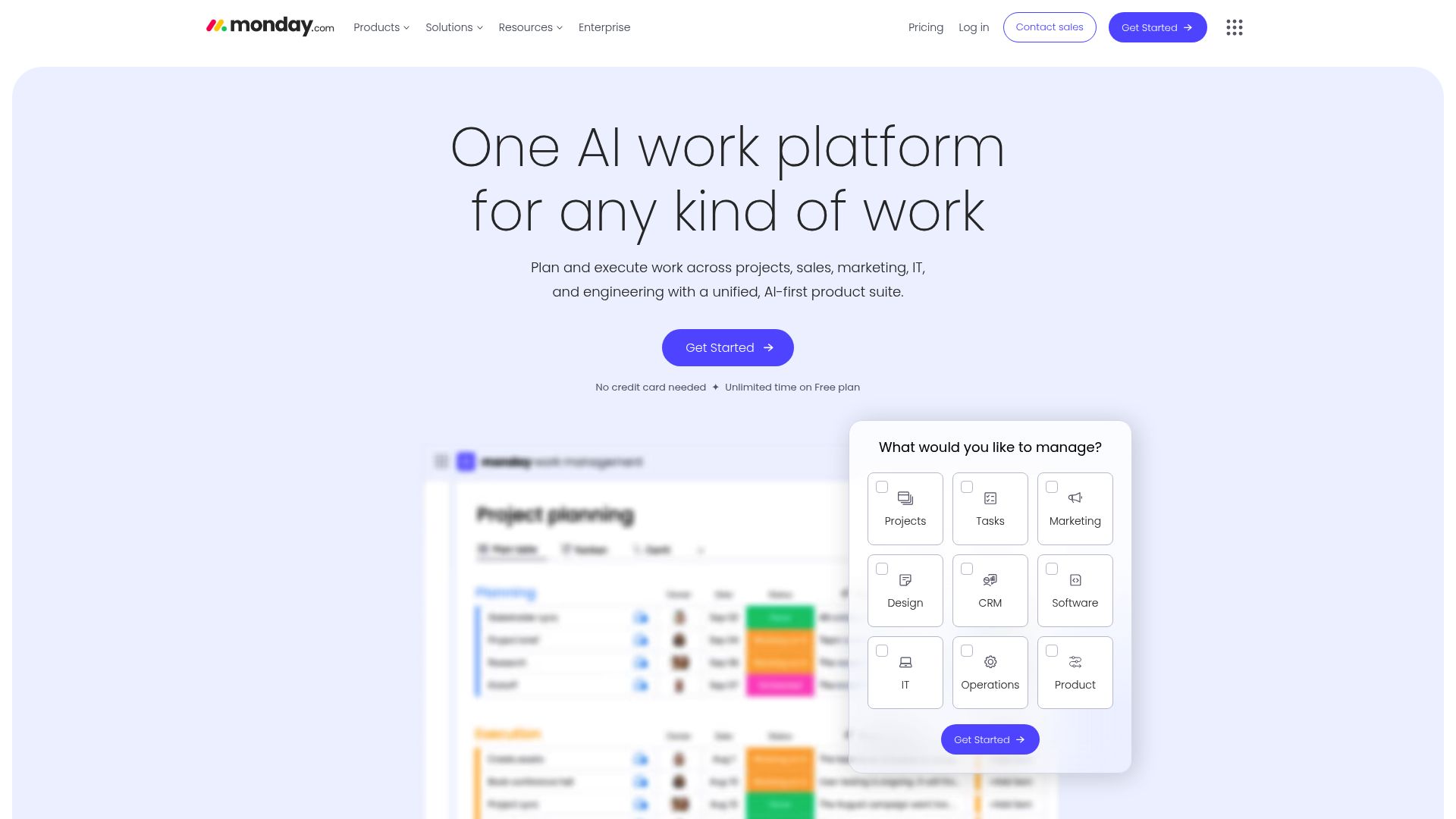
Monday.com’s pricing is flexible: free for up to two seats, with the Basic plan at $8 per seat per month, Standard at $10, and Pro at $19. This tiered approach helps startups and growing teams pick what fits their needs.
Its core features include workflow automation, dashboards, Gantt charts, Kanban boards, collaborative docs, and over 200 integrations. Monday.com’s highly visual interface makes tracking complex projects intuitive, and its automation tools save time on routine tasks.
Startups and teams benefit from Monday.com’s easy onboarding, strong support, and customizable workflows. It’s a favorite for campaign management, product launches, and cross-functional collaboration.
Some users find advanced features locked behind higher-tier plans, and the interface can feel cluttered as projects scale. Despite these minor drawbacks, Monday.com remains a top choice for project management startups that value visual organization and real-time tracking.
Notion
Notion, founded in 2016 in San Francisco with $343.2M in funding, is a standout among project management startups that blur the lines between documentation and project tracking. Valued at $2B, Notion’s all-in-one workspace is a favorite for knowledge-centric teams.
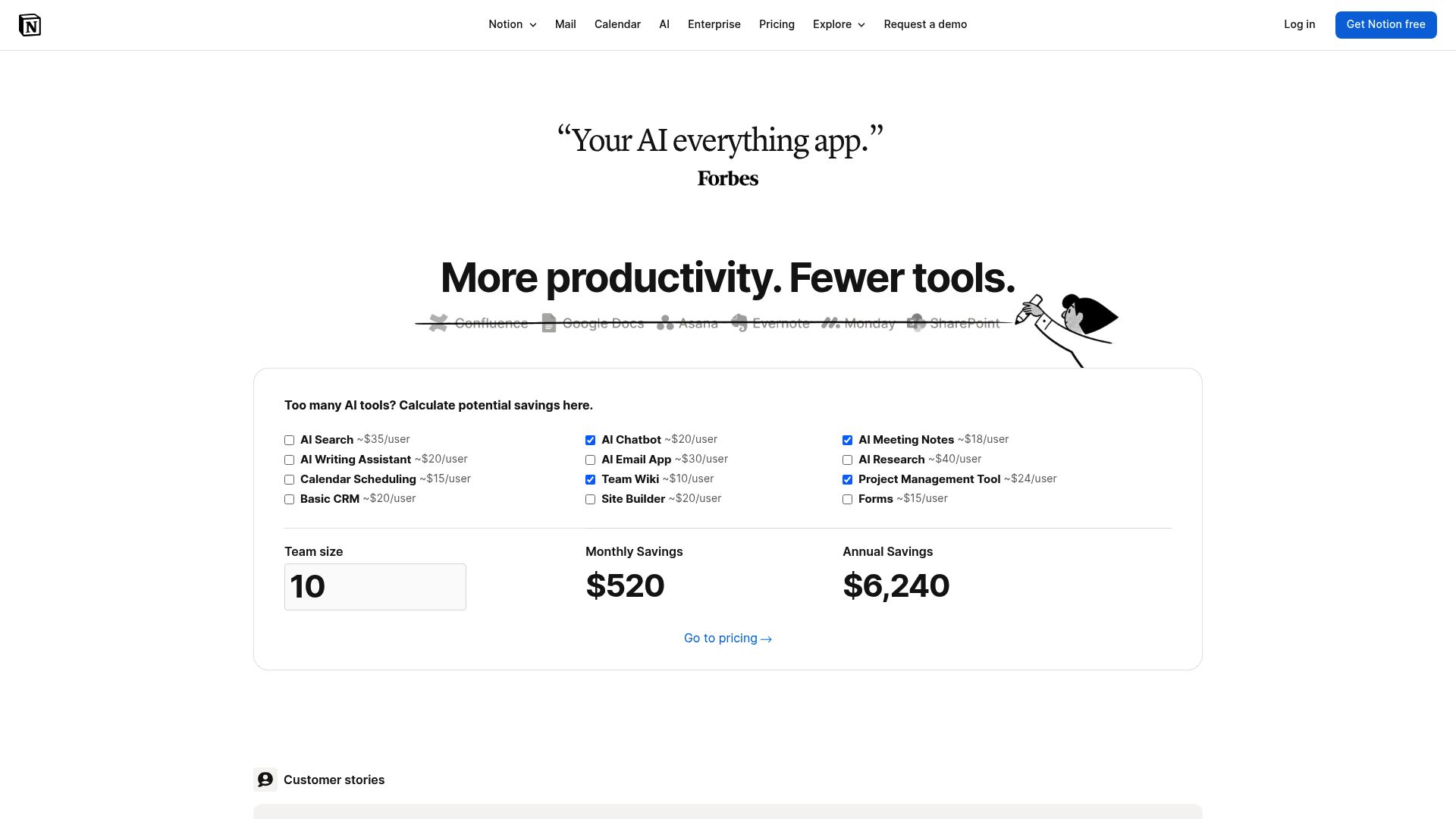
Notion’s pricing starts with a free personal plan, while the Team plan is $8 per user per month. This makes it accessible for startups and growing companies alike.
The platform’s core features include notes, docs, databases, wikis, project management, and a growing list of integrations. Notion’s modular system allows teams to build custom knowledge bases, manage projects, and keep documentation organized in one hub.
Startups, product teams, agencies, and knowledge-driven companies use Notion for everything from engineering docs to marketing plans. Its flexibility is unmatched, with a strong library of community templates.
The main challenge is its steep learning curve for new users and the absence of some advanced project management features out-of-the-box. Still, Notion’s adaptability and community-driven resources make it a powerful tool for project management startups seeking a blend of documentation and task management.
Filestage
Filestage, founded in 2014 in Stuttgart, has carved out a niche among project management startups specializing in content review and approval. With $3M in Series A funding, Filestage streamlines the creative feedback process for agencies and media teams.
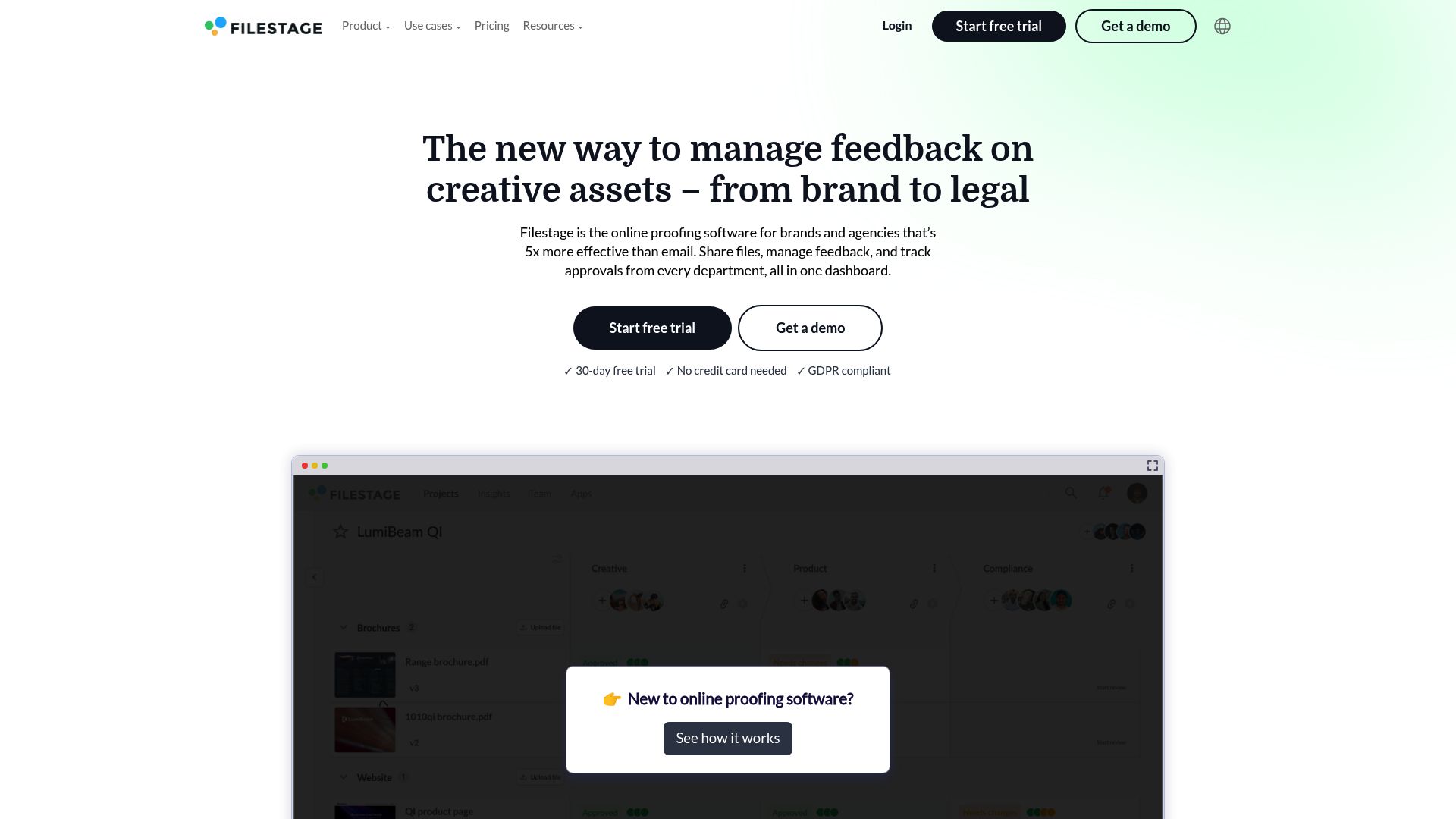
Plans begin at €89 per month for teams. While there’s no free plan, Filestage’s value comes from its focused feature set designed for content-heavy environments.
Core features include robust review workflows, version control, annotation tools, and integrations with creative software. Filestage reduces email overload by centralizing all feedback and approvals in one intuitive interface.
Creative agencies, marketing teams, and media production startups benefit from faster approvals and simplified collaboration. Filestage supports multiple file types, from videos to PDFs, making it ideal for digital campaigns.
Its niche focus means it’s less suited for general project management needs. However, for startups where content review is central, Filestage is a game-changer among project management startups.
Akiflow
Akiflow, founded in 2018 in Padova and backed by $1.9M in seed funding, is gaining traction among project management startups that prioritize personal productivity. In 2023, Akiflow processed over 3 million tasks and saw a staggering 6,500% five-year search growth.
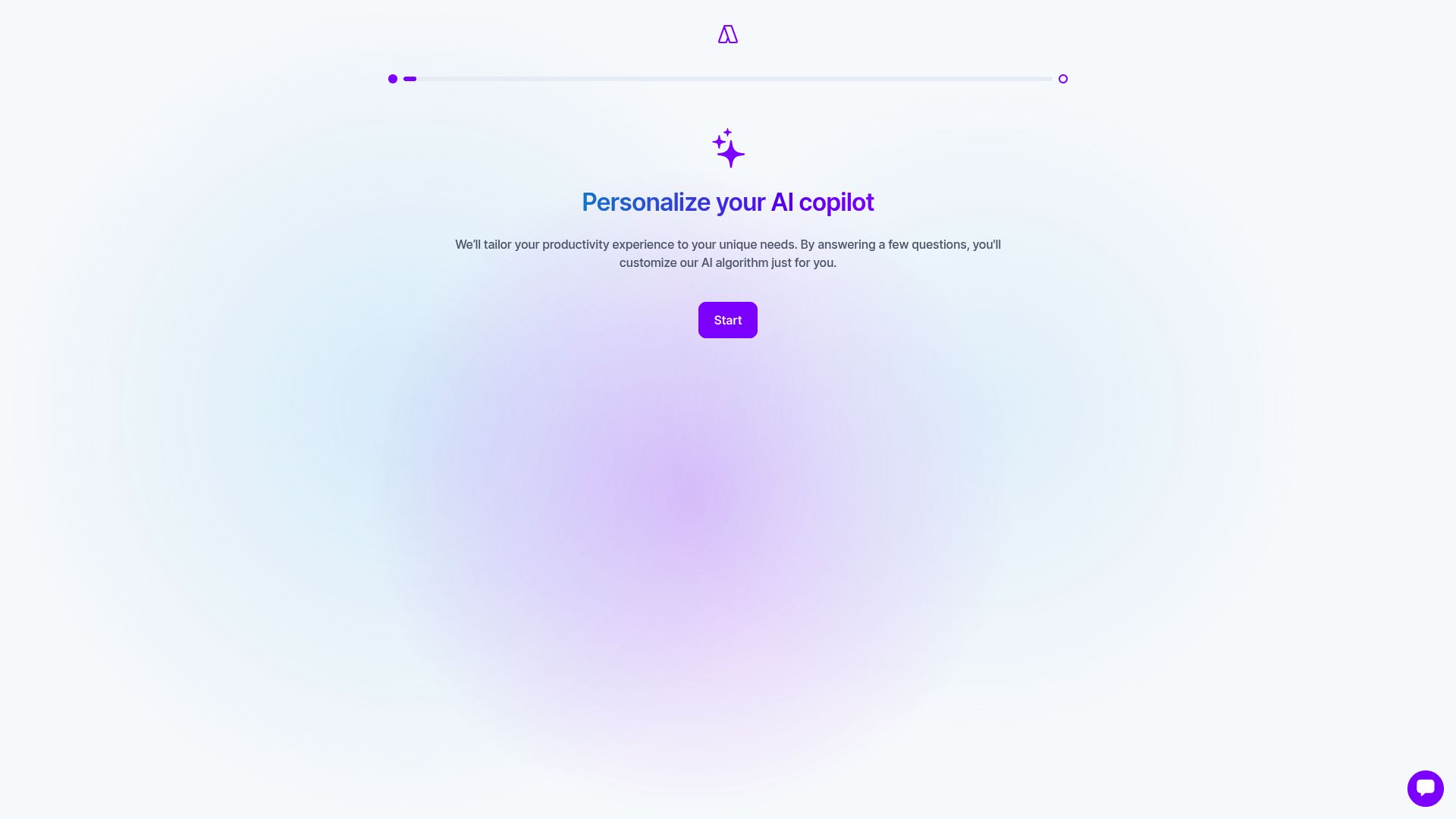
Akiflow offers a free trial, with paid plans starting at $15 per month. It’s designed for startup founders, executives, and teams who need to unify tasks from multiple sources.
Core features include a personal task manager, deep calendar integration, workflow automation, and productivity analytics. Akiflow centralizes all your to-dos and schedules, helping you stay focused and organized.
Pros include easy onboarding, cross-platform support, and seamless calendar syncing. However, Akiflow’s focus is on individual productivity, so it’s less robust for large team collaboration.
For founders and executives who juggle multiple responsibilities, Akiflow stands out among project management startups for its streamlined approach to personal work management.
How to Choose the Right Project Management Startup for Your Team
Selecting the right project management startups can feel overwhelming with so many options available. Your choice will directly impact your team's productivity, workflow, and ability to scale. Let's break down the most important factors and real-world examples to make this decision easier.
Key Criteria for Selection
Before you dive into the world of project management startups, start by assessing your team's size and workflow complexity. Smaller teams may need a simple, intuitive platform, while larger organizations often require advanced automation and integrations.
Integration is another key factor. Ensure the tool connects easily with existing apps like Slack, Google Workspace, or HubSpot. Scalability matters too—choose something that grows with your team.
User interface and onboarding are critical. Look for platforms that minimize the learning curve and offer solid support. Compare pricing tiers to confirm the features you need fit your budget. For deeper insight into lean approaches, check out this Lean product development for startups guide.
Comparing Features and Use Cases
Every project management startup brings a unique set of features. Some prioritize visual task management, while others emphasize automation or reporting. Use the table below to compare at a glance:
| Platform | Best For | Standout Feature |
|---|---|---|
| Filestage | Creative teams | Content review workflow |
| Akiflow | Productivity-focused | Calendar integration |
| Notion | Knowledge management | Modular docs/databases |
Match your needs: If you need creative review, Filestage excels. For founders focusing on productivity, Akiflow is a top pick. Notion is ideal for managing both projects and documentation.
Real-World Startup Scenarios
Consider how other startups use project management startups to solve specific challenges. A remote SaaS team might leverage Taskade to coordinate across time zones, ensuring everyone stays aligned.
A marketing agency could use Filestage to speed up campaign reviews and gather client feedback in one place. Meanwhile, a SaaS startup might integrate ClickUp with sales and support tools to create a seamless workflow from customer inquiry to project delivery.
These scenarios show that the right solution depends on your unique workflow and industry demands.
Common Pitfalls and How to Avoid Them
When adopting project management startups, avoid overcomplicating your workflows with too many features. Keep things simple to ensure your team actually uses the tool.
Plan for onboarding and change management. Underestimating this step can lead to poor adoption rates. Always check integration capabilities and look out for hidden costs in pricing plans. By staying focused on your team's real needs, you’ll sidestep common mistakes and maximize your investment in project management startups.
Future Trends in Project Management Startups for 2025
The landscape for project management startups is entering a new era in 2025, shaped by rapid technology shifts and evolving team needs. Startups are not just catching up; they are leading the charge in redefining how teams collaborate, automate, and make decisions. Let’s explore the four biggest trends set to transform the way modern teams approach project management.
AI and Automation
Artificial intelligence is quickly becoming the backbone of project management startups. New platforms are using AI to automatically prioritize tasks, suggest optimal schedules, and automate repetitive workflows. For example, startups like Motion are integrating AI to minimize manual work and provide actionable project insights.
The impact is clear: teams save time, reduce errors, and focus on high-value activities. As AI continues to evolve, expect more predictive analytics and smarter automation features across the board. To dive deeper into how AI is reshaping this space, check out AI's Impact on Project Management.
Remote and Hybrid Collaboration
The rise of distributed teams has pushed project management startups to prioritize seamless remote collaboration. Tools like Taskade and Akiflow are designed from the ground up for remote-first companies, offering built-in chat, video, and task tracking.
Virtual office features and asynchronous communication are becoming standard. Startups are experimenting with platforms like Teamflow to replicate the energy of in-person teamwork online. As hybrid work normalizes, expect even more solutions tailored to flexible, global teams. Staying competitive means choosing project management startups that excel in remote support and integration.
No-Code and Customization
Flexibility is a major trend for project management startups in 2025. No-code platforms such as Airtable and Notion empower non-technical users to build workflows without writing a single line of code. Teams can quickly create custom dashboards, automate tasks, and adapt processes as needs evolve.
This surge in no-code tools means project management startups can serve a broader range of industries and use cases. The demand for modular, adaptable solutions is only increasing, making customization a must-have for startups aiming to stand out.
Data-Driven Decision Making
Data and analytics are at the core of the next wave of project management startups. Enhanced reporting tools and real-time dashboards let teams visualize KPIs, monitor project health, and react quickly to changes.
Startups are focusing on making insights accessible and actionable, so leaders can make smarter decisions every day. As a result, project management startups that offer robust analytics will be in high demand, especially for teams aiming to optimize remote productivity and performance.
Frequently Asked Questions About Project Management Startups
Curious about project management startups and how they’re shaping the future of work? Here are answers to the most common questions founders and teams ask as they explore the latest solutions for 2025.
What makes a project management startup stand out in 2025?
Project management startups stand out by driving innovation in collaboration, automation, and seamless integration with popular tools. In 2025, platforms that leverage AI to streamline scheduling, automate workflows, and boost team productivity are leading the pack. For a closer look at the most advanced options, check out AI-Powered Project Management Tools in 2025.
Are these startups suitable for all company sizes?
Most project management startups are designed with startup and SMB needs in mind, but many platforms scale smoothly to mid-market and enterprise levels. It’s important to consider your team size, workflow complexity, and how the platform’s features align with your growth plans. The flexibility of project management startups often means teams of any size can benefit.
How do pricing models compare?
Freemium pricing is standard among project management startups, with core features available for free and advanced options unlocked via paid tiers. Expect paid plans to range from $5 to $20 per user each month. The real value comes from comparing the included features and integrations with your team’s specific requirements before making a decision.
What integrations should I look for?
The best project management startups offer integrations with leading tools like Slack, Google Workspace, Zoom, Salesforce, and HubSpot. Prioritize solutions that connect with your existing tech stack to ensure smooth workflows and data consistency across platforms. Integration flexibility is a key factor in long-term success for fast-moving teams.
If you’re feeling inspired by these innovative project management startups and wondering how your own product or website could stand out, you’re not alone. We’ve seen firsthand how the right design—one that truly connects your landing page to your actual product—can make all the difference in conversion rates and reaching product-market fit. If you’d like a fresh set of eyes on your user journey or want practical tips on creating a seamless experience, you can Book a free Product-Website Audit. Let’s make sure your next big project captures your audience from the very first click.
